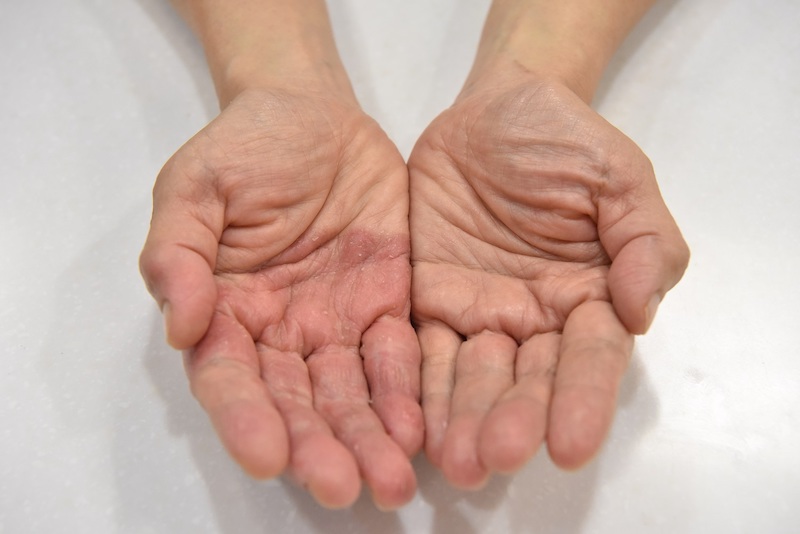A bad itch
Because of this pandemic, we have been washing hands and using hand sanitisers more frequently than before. However, this usage can turn into skin conditions for some.
With the current COVID-19 pandemic, we have been encouraged to wash our hands and use hand sanitisers. However, in protecting ourselves and using them more now than ever, we may also end up getting skin conditions.
Ageless Online checks in with Dr Su Peiqi, a consultant at the National Skin Centre, to find out more:
What are some common skin conditions during this period with the frequent use of hand sanitisers, wipes, etc?
In the current COVID-19 pandemic, hand washing and the use of sanitisers have become crucial for infection control. Whilst hand hygiene is important, excessive water exposure or contact with hand hygiene products may result in skin irritation and inflammation (dermatitis), secondary skin infections, and in some individuals, aggravation of existing skin conditions.
One of the most common skin conditions seen is irritant contact dermatitis, particularly of the hands. Symptoms may vary from mild to debilitating and include dryness, irritation, itching and in more severe cases, cracking and bleeding. In rarer cases, an allergy to an ingredient in a hand hygiene product can also develop. This is known as allergic contact dermatitis.
Nails can also be affected and become cracked or brittle with frequent hand washing or the use of hand sanitisers.
What treatment is available for each of these conditions?
Hand hygiene products damage the skin by causing denaturation of proteins in the skin barrier. Frequent hand washing and the use of alcohol-based sanitisers may also cause depletion of the lipid barrier in our skin, leading to excessive dryness. Thus, to maintain skin health and the skin barrier, applying a moisturising lotion or cream after hand washing is recommended.
If there is active skin inflammation (dermatitis), topical anti-inflammatory medications such as topical glucocorticoid creams may be required. Topical antimicrobial therapy may be useful in cases where there are open cuts or infected wounds. However, in more serious cases, oral medications may be necessary.
When should one then see a skin specialist?
Prompt referral to a skin specialist is necessary if persistent rashes or inflammatory symptoms such as redness and itching appear. In addition, if there is no improvement or worsening of the skin condition despite preventative measures and the regular use of moisturisers, it is also best to seek advice from a specialist early to prevent further deterioration of the skin condition.
How best to keep these skin conditions from happening? What is a good moisturiser?
The regular and frequent use of moisturisers is paramount in both the treatment and prevention of skin irritation and inflammation arising from frequent hand hygiene practices. Apply moisturisers every time after hand hygiene if possible as they help to relieve skin dryness.
Scrubbing hands while washing and the use of hot water should also be avoided to minimise further disruption of the skin barrier and exacerbation of skin inflammation.
Wear gloves when using household disinfectant products to minimise skin irritation and skin barrier disruption. However, avoid prolonged use of gloves as this may cause maceration or irritation from sweat. The use of cotton gloves inside latex gloves could help minimise this and one should continue to apply hand moisturisers frequently.
There are many good moisturisers on the market but the important thing to remember is the regular and frequent use of one rather than none at all.
Occlusive moisturisers such as petrolatum help to reduce water loss from the skin. Moisturisers which contain glycerin and urea help to draw water into the skin. Some moisturisers contain emollients such as ceramides (a form of lipid) which also help to replenish the skin barrier and protect the skin against harsh chemicals. This is especially beneficial for skin conditions that cause irritation and redness.
| SIDEBOX: Tips on mask wearing
Wearing a mask is mandatory in public spaces and is an important measure in help to curb the spread of the pandemic. However, prolonged wearing of masks can cause abrasions, cuts, redness, pressure injuries, irritation and itching. Furthermore, in sweaty or humid conditions, some people may suffer from acne breakouts. The following tips may help:
What should you do if the mask irritates your skin? Irritant contact dermatitis may present with redness and dryness from prolonged mask wearing. If severe skin inflammation (dermatitis) persists, see a dermatologist early. Topical steroids may be required to treat more serious cases. ** The above is contributed by Dr Su Peiqi. |


0 Comments